Biography Father Simon El-Zind
Simon El-Zind was born on February 28, 1960 in Ghadir (Lebanon). His father Abdo and his mother Helen raised him in the Christian faith, in a devout maronite environment, with his eldest brothers Raymond and Farès and his youngest sisters Raymonda and Maya.
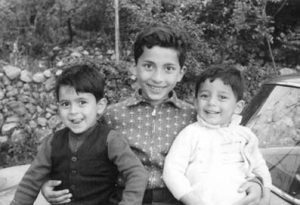
Between 1963 and 1970, he completed his primary studies in the Apostles’ College (College des Apôtres), where he was gifted by excellent school faculties since the beginning. At the end of the primary cycle, the superior of his college, Father Paul Najem, offered him half a scholarship as a reward for his hard work.
He pursued his complementary studies at the public school of Ghazir between 1970 and 1975. The start of the war made him change schools, and it is finally at Haret Sakher’s public high school (Jounieh) that he got his baccalaureate of secondary studies in September 1977.
Inclined as he was to scientific fields, he pursued his electronic technical studies until 1981. Simultaneously, he joined St.- John the Baptist Clan of the Scouts Group of the Apostles’ College on October 30, 1977. This movement was a determining factor in the molding of his life ideals.
The young Simon was particularly influenced by Father Boutros Chalhoub, member of the Lebanese Maronite Missionaries’ Congregation and founder of the Scouts Group in the Mount-Lebanon, who left his indelible mark on the character and the ultimate vocation of the young man.
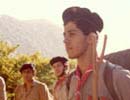
Inspired by Father Chalhoub, Simon benefited from a very strong scouts’ education within St. – John the Baptist’ Clan. Helped by Bechara Khabsa, the chief of his team, he prepared his scouts promise, which he made in Bkerkeh on May 27, 1978. Then he had his ” First Eve ” in Ghosta on January 20, 1979, following a load of reflection accompanied by Edouard Bourgi. On January 26, 1979, with Samir Farhat as godfather, he was awarded by his Clan the totem of Joyous Jackal. The following day, he took charge of the Flame team. His mandate as a chief of team ended on November 15, 1980, at the end of a weekend where he pledged to be assistant Chief of Clan. On August 1st, 1981, in the pine grove of Harissa, he assumed the responsibility of Chief of St.- John’s Clan in a celebration during which Edward Bourgi was nominated Chief of Group and Fadi Barhouche started his journey on the “Road”.
In parallel, Simon assumed, from October 1980, the functions of national assistant Commissioner of the Road Branch of the Scouts of Lebanon during three consecutive years. At that time, the National Commissioner of the Road Branch was Salameh Hosahymeh, former Chief of St. – John the Baptist Clan.
These obligations ended on August 4, 1984, during a closing ceremony held in the Apostles’ College where he transmitted the torch to Youssef Zgheib who became assistant chief of Group. Few months later, on December 23, 1984, he was named Chief of Group during the Christmas fiesta in the College. He remained in this function for one year and on December 23, 1985 passed over the title to Kamal Zakhour.
Saturday May 26, 1984 marked the climax of his scouts itinerary. On that day, in the forest of Harissa, under his godfather Michel Sakr‘s understanding look, and after receiving the joint blessing of Father Chalhoub, his scouts example and spiritual mentor, and of Mgr Roland Abou Jaoude, former troop Chief, Simon took the “Road”. This event marked the apogee of a rich scouts course lived in a merely Christian authenticity and fidelity.
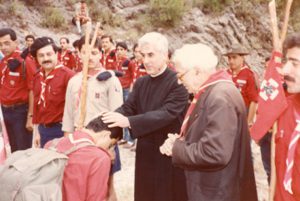
The following day of his departure was a true date – hinge in his life. That Sunday, during a Mass of graces in Chnaniir, in the domain of the Choueiri, he announced to the scouts’ community, in presence of his scouts and sacerdotal godfather, Father Sami Bteiche, Lebanese missionary, the decision that will pleasantly surprise all the attending audience, including his parents: to commit himself to follow the ways of the Lord and become a priest. From this day on, he was to inaugurate a new chapter far more luminous of his life so penetrated by the Redeemer’s presence.
Affiliated Seminarist in the Maronite diocese of Jounieh, he began his studies of theology at the Holy Spirit University of Kaslik (USEK) in Lebanon and crowned them in July 1989 by a degree. During this period, Simon was especially marked by his professor’s example, priest Boutros Azzi, and by his fervid and insistent leitmotif: “Love the church! Love the church!” These words will remain engraved forever in the memory of the Lord’s new man.
During his academic years in USEK, the young Simon was ordained sub deacon on December 4, 1988 in the chapel of the patriarchal seminary of Ghazir (Lebanon) with about twenty friends from his promotion, then deacon on August 13, 1989 in St. – Georges Church in Kfour (Lebanon) with Robert Daccache and Antoine Bechaalani. One month later there came the big day of his life: the one of his sacerdotal ordination on September 14, 1989, in the patriarchal seminary of Ghazir, by Mgr Choukralla Harb, bishop of Jounieh.
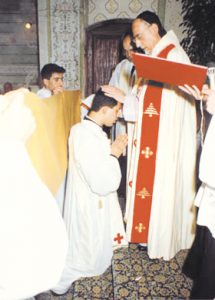
The young Simon, still seminarist, had signed, moreover, a first on the level of the spiritual accompaniment: he was, indeed, the spiritual counselor of the first youth team of Notre Dame (ENDJ) founded in Lebanon by Kamal Chemali, Karine Nohra and Rania Boustani, the team he will accompany from 1986 to 1989, in particular during the International Gathering of the ENDJS in Fatima (Portugal), in July 1989. During this gathering, he made some friends among the Italian members of the ENDJS.
Providence had it, some weeks after this gathering and five days after his sacerdotal ordination, that his superiors sent him to improve his theological academic formation in Rome. Hardly installed in the Italian capital, he asked and got to assume the spiritual accompaniment of the Roman team ENDJ known as ” Rome II “, responsibility that he will fulfill until the summer of 1992.
In the Eternal City, Father Simon lived in the College ” Russicum “, in the direct surrounding of the Sainte – Marie Majeure Basilica. At first he attended courses at the Gregorian Papal university, held by the Jesuit Fathers, where he crowned his studies by a canonical license in dogmatic theology in February 1992 on a theme that will always remain dear to his heart: the couple and the family. The title of his ” tesina “, or memory, was: ” Mystery, Mystical and Mission of the Christian Marriage in the writings of abbot Henri Caffarel “, founder of the well known ” Notre Dame teams “. In a letter addressed to Father Simon on January 6, 1992, abbot Caffarel, who received a copy of the ” tesina” by the author’s cares, described it as “one of the best studies that he has ever read “, adding to the address of Father Simon that ” in spite of the urgent works, I could not stop going all over your memory with greed and admiration for your perspicacious and conscientious work“.
During his very rich academic experience in the “Gregoriana “, Father Simon was particularly impregnated by the rigor and the spirituality of his thesis director, Father Pierre Adnès, sj, for whom he will keep a deep gratitude.
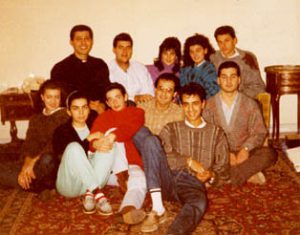
After obtaining his canonical degree, Father Simon immediately tackled the preparation of a doctorate in ecclesiology at the Oriental Papal Institute in Rome on the theme of ” The Maronite Ecclesiology in the texts of the service for the celebration of the Dedication “, under the direction of Father Pierre Youssef, patriarchal priest of the Chaldeans in Paris and professor of Syriac patrology in the institute. Father Simon worked there until June 1994, when his bishop called him to assume his parochial functions in Haret Sakher (Jounieh). Suspending then his academic research, Father Simon went back to Lebanon on September 28, 1994 and began a third course in his life, the one of the parish engagement.
He was already familiar with this engagement during his stay in Rome. In parallel with his academic studies, Father Simon did not hesitate to hold pastoral responsibilities as assistant priest to many Catholic parishes in Europe. He assumed, from 1990 to 1991, the responsibility of ecclesiastic assistant of Don Andrea Santoro, parish priest of “Gesu di Nazareth” in the Zona Pietralata (Rome), and worked from 1991 to 1994 with Don Luigi Zangrilli, parish priest of ” San Francesco of Assisi ” in Cisterna, in the Italian province of the Latina.
That was not all. Episodically, he also assumed pastoral responsibilities in other parishes in Italy, Switzerland and Germany [” San Pietro Candelo ” in Biella (Italy) during Christmas 1989, Easter 1990 and July 1990; ” Parocchia di Introbio” in Lecco (Italy) during Christmas 1990; ” San Martino ” in Camorino (Switzerland) during Christmas (1991-1994), Easter (1990-1994) and July (1991-1993); parish of Aschaffenburg in Bavaria (Germany) in October 1992]. He also benefitted from some summer vacations to deepen his knowledge of the German language [stay at the Goethe – Institute in Murnau (Germany) in the summer of 1991, stay at the Gotz in Freiburg (Germany) in September 1992].
His pastoral efficiency during his stay in Rome allowed him to weave strong ties among his different European parishes and to achieve a libano-italian cooperation project for scouts. Upon his initiative, the Swiss parish of Camorino invited the Italian scouts group of Cisterna to celebrate Easter 1993 in their parish. The scouts accepted the invitation and came with their Lebanese chaplain to liven up the celebrations of the Ascension Day, Good Friday and Easter Sunday. Also upon his initiative, the scouts of Cisterna had invited 17 Lebanese scouts (eight of the Apostles’ Group and nine of the Group St. – Maron of Chekka) to a flying camp followed by a stationary camp in Italy in July 1992. It was an unforgettable moment for the participants.
Father Simon knew how to tie deep friendships also in Italy and Switzerland, relations that he will maintain after his return to Lebanon. Among those that proved to be the strongest, we mention: in Candelo, Mrs. Rita Pezzana, who Simon used to call “Mamma Rita ” and considered her like a second mother, as well as the family Pessa (Paolo and Dianella with their daughter Francesca); in Camorino, the family Descritophoris (Mario and Maria Rosa with their daughters Ulda and Cinzia); finally, in Cisterna, the family Mercuri (Alberto and Maria Pina with their daughters Maria Dina, Claudia and Sara), a family who was especially close to his heart and with whom he used to stay every time he went on vacation to Italy after his definitive return to Lebanon on September 28, 1994.
Read more...
Read less
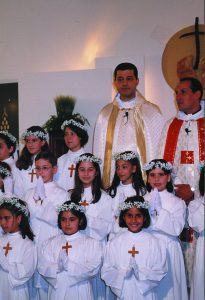
It is in Saint – Maron’s parish that Father Simon revealed his pastoral qualities. He gave back life and vigor to the feminine laic brotherhood of the Immaculate Conception and of Saint – Joseph, as well as the Marian union. Then he launched new parochial initiatives everywhere: he divided the parish into homogeneous pastoral zones each under a Saint’s protection; created the “families Communities “, adapted version of the Notre Dame teams, promoted the life of couples and families within the parish, started the children’s Mass, the Youth Mass, the group of prayer; the parochial choir; the Children’s choir named ” Choir of Charity ” and the daily processions during the Marian month.
Along with his regular pastoral activities, Father Simon brought a particular care to the organization of high quality cultural activities inside his parish and the promotion of pastoral sharing among Catholic Churches of different rituals. He also accumulated several responsibilities outside his parish: He was member of the catechetic diocesan commission (1994-1999); member of the Youth diocesan commission (1994 -¼); member of the Ministerial Council (1994-1999); catechist in St. – John school of Okaybeh (1994-1998); spiritual animator in the Ste Famille Française college in Jounieh (1999-2001); chaplain of the Social Scouts Group in Jounieh (1998 -¼); dogmatic theology professor in St. – Peter and Paul’s center for the training of laymen in Azra (1996 -¼); lecturer at the preparation sessions for marriage in the diocese of Jounieh since their launching in 1996.
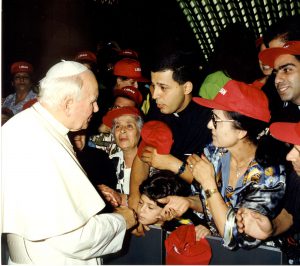
On June 8, 2001, Father Simon traveled to Rome accompanied by a group of parishioners on the occasion of the canonization of the Lebanese Monial Rafqa el Rayyess. On June 12, 2001, two days after the canonization of St Rafqa, he went to meditate at the sanctuary of Padre Pio of Pietrelcina in San Giovanni Rotondo (Foggia, South of Italy) and asked his intercession so that the Lord helps him to preserve his priesthood healthy and holy. Indeed, after seven years of parochial labor, tiring and fruitful, Father Simon felt the need to take a radical step back, wanting ardently to do what he will call, in a very meaningful manner, a ” Quality leap” in his sacerdotal itinerary: he feared that the routine and the baldness will make his relations with the Lord mediocre.
Thus he asked his bishop for permission to quit, for some time, his parochial responsibilities in order to recapitulate his course of life in meditation and prayer and to resume his academic studies and complete his doctorate. His request was granted. On August 20, 2001, by way of personal recollection, he accompanied from Rome a group of Italian disabled in pilgrimage to Notre – Dame of Lourdes (France). There, and while he attended a physical handicapped , he felt a sharp pain pounding at his back that he attributed at first to a false movement. On September 8, 2001, he left Rome, in pilgrimage to Notre – Dame of Medjugorje (Bosnia). The backache persisted, but it didn’t hinder him from continuing his meditations and his prayers intensely and preparing his conferences due to take place during the recollection days of the vicars of the Maronite diocese of Byblos from September17 to September 19, 2001, the day following his return to Lebanon. As his backache worsened, he finally trusted the advice of his friends and agreed to undergo a medical exam, which revealed a metastasis.
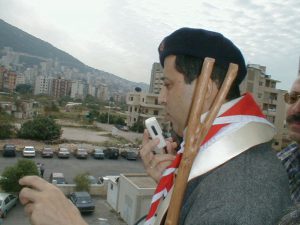
Father Simon was admitted to the Saint – Louis hospital in Jounieh on October 10, 2001. A fourth stage of life had began, a stage so rich in spiritual maturity, so intense in personal conversion, that he wanted to live it in his very core and was keen to testify to his parishioners, his scouts family and his family circle. He systematically asked his parishioners, friends, priests, laymen, scouts, guides, young and old, all stricken by the news and who hastened to offer their help, to live with him this event as a “sign” of the divine proximity, a “call” to the conversion of souls and consciences, and forget what he called in a terse style, the “accident” of his illness. In his intention, chains of prayer were formed. They included believers from all countries who took turns on the prayer day and night. Regularly, Masses were said almost everywhere to implore his recovery. Circles of prayer and reflection were formed. On the instigation of father Simon who accompanied them from his hospital bed, they displayed a strong will to incite their members to a spiritual quality leap in order to reach an evangelical fidelity much more committing. The Scouts family of the Apostles wrote a prayer to implore the recovery of Father Simon, their brother, their chief and their chaplain, through the intervention of Father Chalhoub, founder of the scouts family and model of a holy life deeply venerated by Father Simon. Other groups and parishes started pilgrimages of conversion in his intention. It seemed as if everyone suddenly wanted to skip stages on the road leading to the Beatitudes.
May 10th 2002 was the date of P. Simon passage to the eternal light, since then « Darbessama » saw the light to continue his path of testimony and create projects already communicated during his lifetime.
Father Simon wanted this site on the Internet network to be a banquet of faith, hope and love to which he himself invites us to share with him in prayers, reflection, testimony and authentic conversion of hearts and souls, the joyous and resolute certainty of being Sons of God in Jesus Christ and apostles of His evangelic Truth.
We made this desire ours and we thrive to respond to it faithfully. We would also like to pay tribute to a scouts and Christian community profoundly thankful to a true boy scout of the ways of the Lord our Father, to a pastor in love with Jesus Christ and to a joyous breath of the Holy Spirit that will thrust our Church and our country towards a new Pentecost.
